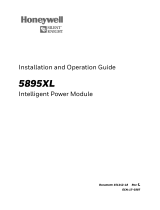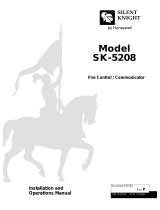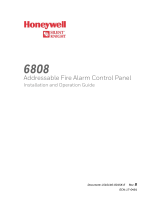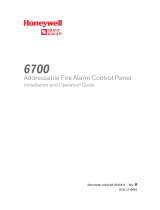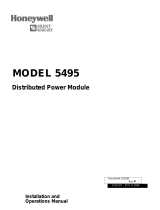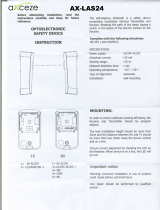
OSI-RI-FH
Single-ended Reflected
Type Projected Imaging
Beam Smoke Detector –
Intelligent
Installation Guide
October 2018
Document No.: E56-6585-001 (33810_01)


OSI-RI by Honeywell - Farenhyt OSI-RI-FH Installation Guide
E56-6585-001 | October 2018 i
Intellectual Property and Copyright
This document includes registered and unregistered trademarks. All trademarks displayed are the trademarks of
their respective owners. Your use of this document does not constitute or create a license or any other right to use
the name and/or trademark and/or label.
This document is subject to copyright owned by HPSS (Honeywell Products & Solutions Sarl). You agree not to
copy, communicate to the public, adapt, distribute, transfer, sell, modify or publish any contents of this document
without the express prior written consent of Honeywell - Farenhyt.
Disclaimer
The contents of this document is provided on an “as is” basis. No representation or warranty (either express or
implied) is made as to the completeness, accuracy or reliability of the contents of this document. The manufacturer
reserves the right to change designs or specifications without obligation and without further notice. Except as
otherwise provided, all warranties, express or implied, including without limitation any implied warranties of
merchantability and fitness for a particular purpose are expressly excluded.
General Warning
This product must only be installed, configured and used strictly in accordance with the General Terms and
Conditions, User Manual and product documents available from Honeywell - Farenhyt. All proper health and safety
precautions must be taken during the installation, commissioning and maintenance of the product. The system
should not be connected to a power source until all the components have been installed. Proper safety precautions
must be taken during tests and maintenance of the products when these are still connected to the power source.
Failure to do so or tampering with the electronics inside the products can result in an electric shock causing injury
or death and may cause equipment damage. Honeywell - Farenhyt is not responsible and cannot be held
accountable for any liability that may arise due to improper use of the equipment and/or failure to take proper
precautions.
Critical Product Security
Open Source Software
This product contains open source software provided by third parties. It does not necessarily use all of the third
party software components. Go to http://www.security.honeywell.com/opensource/ for a detailed list of the third party
software used and the associated open source license agreement(s).
Firmware Updates
This device supports firmware upgrades via its USB port. When performing a firmware update the new firmware
update file should be downloaded from the Honeywell - Farenhyt website and saved to a USB memory device that
has had all of its content removed.
Approved firmware version: S03-0089-000.
Device and System Security
Before installing this product ensure that the two security seals on the packaging are unbroken and the product has
not been tampered with since leaving the factory. Do not install this product if there are any indications of
tampering. If there are any signs of tampering the product should be returned to the point of purchase.
It is the responsibility of the system owner to ensure that all system components, i.e. devices, panels, wiring etc., are
adequately protected to avoid tampering of the system that could result in information disclosure, spoofing, and
integrity violation.
This device utilizes Secure Boot to validate the device’s software using a hardware root of trust and cryptographic
signatures. If the software cannot be validated the device will generate a trouble condition in the system.
Liability
You agree to install, configure and use the products strictly in accordance with the User Manual and product
documents available from Honeywell - Farenhyt.
Honeywell - Farenhyt is not liable to you or any other person for incidental, indirect, or consequential loss, expense
or damages of any kind including without limitation, loss of business, loss of profits or loss of data arising out of your
use of the products. Without limiting this general disclaimer the following specific warnings and disclaimers also
apply:

OSI-RI-FH Installation Guide OSI-RI by Honeywell - Farenhyt
ii E56-6585-001 | October 2018
Fitness for Purpose
You agree that you have been provided with a reasonable opportunity to appraise the products and have made
your own independent assessment of the fitness or suitability of the products for your purpose. You acknowledge
that you have not relied on any oral or written information, representation or advice given by or on behalf of
Honeywell - Farenhyt or its representatives.
Total Liability
To the fullest extent permitted by law that any limitation or exclusion cannot apply, the total liability of Honeywell -
Farenhyt in relation to the products is limited to:
i. in the case of services, the cost of having the services supplied again; or
ii. in the case of goods, the lowest cost of replacing the goods, acquiring equivalent goods or having the goods
repaired.
Indemnification
You agree to fully indemnify and hold Honeywell - Farenhyt harmless for any claim, cost, demand or damage
(including legal costs on a full indemnity basis) incurred or which may be incurred arising from your use of the
products.
Miscellaneous
If any provision outlined above is found to be invalid or unenforceable by a court of law, such invalidity or
unenforceability will not affect the remainder which will continue in full force and effect. All rights not expressly
granted are reserved.

OSI-RI by Honeywell - Farenhyt OSI-RI-FH Installation Guide
E56-6585-001 | October 2018 iii
Document Conventions
The following typographic conventions are used in this document:
Convention Description
Italics Used to donate: references to other parts of this document or other
documents. Used for the result of an action.
Contact Us
Honeywell - Farenhyt
12 Clintonville Road
Northford, CT 06472-1610
203-484-7161
Fax: 203-484-7118
www.silentknight.com
Codes and Standards Information for Smoke Detection
It is strongly recommended that this document is read in conjunction with the appropriate local codes and
standards for smoke detection and electrical connections. This document contains generic product
information and some sections may not comply with all local codes and standards. In these cases, the local
codes and standards must take precedence. The information below was correct at time of printing but may
now be out of date. Check with your local codes, standards and listings for the current restrictions.
Control Panel Compatibility
Please refer to the operation manual for the UL listed control panel for specific operation. The projected beam
smoke detectors require compatible addressable communications to function properly. Connect these
detectors to listed-compatible control panels only.
Product Listings
l UL
l FM
l CSFM

OSI-RI-FH Installation Guide OSI-RI by Honeywell - Farenhyt
iv E56-6585-001 | October 2018
Table of Contents
1 Specifications 5
2 Before Installation 7
3 General Description 9
4 Special Applications 11
5 Approved Accessories 13
5.1 6500MMK 13
5.2 BEAMHKR 13
5.3 RTS151KEY (Test Function) 13
6 Package Contents 15
7 Detector Placement 17
7.1 Example for spacing according to NFPA 72 17
8 Mounting Locations 19
9 Mounting Instructions 21
9.1 Mounting the Reflector 21
9.2 Mounting the Imager 22
10 Mounting Considerations for Single Ended Beam Detectors 23
11 Wiring Installation Guidelines 25
12 Installation/Alignment 29
12.1 Pre-alignment Checklist 29
12.2 Coarse Alignment 29
12.3 Fine Adjustment 30
12.4 Completing the Installation 31
12.5 Final Verification 31
13 Testing and Determining the Sensitivity of the Unit 33
13.1 Calibrated Test Filter 33
13.2 Remote Test Station 33
14 Operation After A Power Failure 35
15 Maintenance 37
16 Painting 39
17 Special Note Regarding Smoke Detector Guards 41
A Appendix I. Operation Modes and Troubleshooting Guide OSI-RI-FH: 43
B Appendix II. Reflector Drilling Template 45

OSI-RI by Honeywell - Farenhyt OSI-RI-FH Installation Guide
E56-6585-001 | October 2018 5
1 Specifications
General Value
Range: 16.4 to 328 Feet (5 to 100m)
Sensitivity: Automatic sensitivity threshold level setting at start up.
Spacing: 30 to 60 Feet (9.1 to 18.3m) - Observe National and local regulations
Response Time: ALARM - 20 seconds typical; TROUBLE - 30 seconds typical
Trouble Conditions: Beam Blockage (96% or More Obscuration)
Improper Initial Alignment
Self-compensation limit reached (service needed)
In Alignment/Commissioning mode
Test/Reset Features: Electronic simulated smoke test from ground level
Sensitivity Filter
Indicators: ALARM - Remote Output, Local LED (red)
TROUBLE - Remote Output, Local LED (yellow), Blink Pattern Indicates Trouble
Diagnostics
NORMAL OPERATION - Local LED (flashing green once every 1 second)
ALIGNMENT AIDS - Laser pointer and optical intuitive alignment guidance with
directional arrows
Style 7 Operation: On-board isolators provide style 7 operation (may be disabled via shunts on
circuit board)
Environmental Value
Temperature: –4°F to 131°F (-20°C to +55°C). Product UL listed for use from 0°C to 37.8°C
(32°F to 100°F).
Note: For applications below 32°F (0°C), refer to section 4
Humidity: 0% to 95% RH Non-condensing
Mechanical Value
Shipping Weight: Complete unit: 3.91 lbs (1.77kg)
Shipping Size: 10+7/8” X 8+7/8” X 7” (26.28 cm x 21.2 cm x17.78 cm)
Mounting: Wall only without optional accessories
Wiring: Plug-in Terminal Blocks (14 AWG / 2.08 mm²)
Adjustment Angle: Detector 50° horizontal and 20° vertical beam alignment
Reflector ±10° Horizontal and Vertical
Paintable Trim Ring: May be painted using enamel or acrylic type paints

OSI-RI-FH Installation Guide OSI-RI by Honeywell - Farenhyt
6 E56-6585-001 | October 2018
Electrical Value
Voltage: 15 to 32 VDC (24VDC nominal)
Standby Current Maximum Standby Current
@32V polling device 1 per second 13mA
@ 24V polling device 1 per second 14mA
@15V polling device 1 per second 20mA
Maximum Alarm Current (LED on)
@32V polling device 1 per second 22mA
@ 24V polling device 1 per second 15mA
@15V polling device 1 per second 22mA
External Supply: Voltage – 15 to 32 VDC
Current – 0.5 A Max. for heater
Reset Time: 500 msec maximum
Start-up Time (after power
up):
30 seconds maximum
Alarm Verification Time: 5 seconds maximum
Remote Outputs: VOLTAGE – 15 to 32 VDC;
Note: Output voltage same as device input voltage
CURRENT - 15mA maximum; 6mA minimum;
Note: Output current is limited by 2.2Kohm resistor
Remote annunciator
RTS151KEY/RTS151KIT
VOLTAGE – 10.2 to 32 VDC
CURRENT - min 9 mA - max 11 mA

OSI-RI by Honeywell - Farenhyt OSI-RI-FH Installation Guide
E56-6585-001 | October 2018 7
2 Before Installation
Please thoroughly read this guide and applicable sections of OSID Global Application Note, document no.
(25686). This manual is available online at www.farenhyt.com.

OSI-RI-FH Installation Guide OSI-RI by Honeywell - Farenhyt
8 E56-6585-001 | October 2018
This page is intentionally left blank.

OSI-RI by Honeywell - Farenhyt OSI-RI-FH Installation Guide
E56-6585-001 | October 2018 9
3 General Description
The OSI-RI-FH is a long range projected beam smoke imaging detector designed to provide open area
protection. It is to be used with listed (UL, EN54, etc.), control panels only. The detector consists of a
transmitter/receiver unit and a reflector. Smoke entering the area between the transmitter/receiver and
reflector causes a reduction in signal. When the obscuration reaches the alarm threshold (automatically set at
the transmitter/receiver unit), the detector generates an alarm signal. Complete blockage of the beam causes
a trouble signal. Slow changes in obscuration due to a build-up of dirt or dust on the lens of the detector are
compensated for by a Microcontroller that continuously monitors the signal strength and periodically updates
the alarm and trouble thresholds. When the self-compensation circuit reaches its limit, the detector generates
a trouble signal, indicating the need for service.
Three LEDs on the detector indicate the current status: a red LED for alarm, a yellow LED for trouble, and a
blinking green LED for standby operation.
Note: The panel controls the status of the red and green LEDs.
The alarm LED can be latched and can be reset by a FACP command.
The yellow LED will blink in specific patterns to provide a diagnostic aid when diagnosing the cause of a
trouble signal. Trouble signals automatically reset upon removing the cause of trouble. Red and yellow LEDs
can be remotely connected to the remote Alarm and Trouble outputs. These outputs mimic the functions of the
detector’s red and yellow LEDs.
After commissioning the 4 arrows will indicate the level of automatically set sensitivity.

OSI-RI-FH Installation Guide OSI-RI by Honeywell - Farenhyt
10 E56-6585-001 | October 2018
This page is intentionally left blank.

OSI-RI by Honeywell - Farenhyt OSI-RI-FH Installation Guide
E56-6585-001 | October 2018 11
4 Special Applications
Due to the inherent capabilities of projected type beam detectors they are often installed in locations where
spot-type detection is impractical. Projected type beam smoke detectors are ideally suited for environmental
conditions that might include high ceilings or areas with difficult access to the ceiling. Often these conditions
present special problems for the installation of spot-type detectors and even greater problems for their proper
maintenance. Due to the inherent flexibility of mounting locations and large coverage area of projected type
beam detectors often the conditions above can be addressed or minimized. Some examples of applications
for beam detectors might include aircraft hangars, cold storage warehouses, shipping warehouses, enclosed
parking facilities, sporting arenas and stadiums or concert halls. Some of these environments might be
considered not suitable for spot-type smoke detectors.
Before installing the transmitter/receiver unit or reflector in these types of applications special consideration
should be given to ensure proper operation of the beam detector. The beam detector should not be installed in
environments where heavy condensation or icing is likely. Condensation or icing of the reflector surface or the
outer surface of the transmitter/receiver unit will obscure the light beam resulting in a nuisance alarm. If
elevated humidity levels and rapidly changing temperatures can be expected then condensation will likely
form and the application should not be considered acceptable for the beam detector.
In environments where a mild condensation is expected, the standard on-board lens heaters can be initiated
by activating the heating switch located in the detector.
The beam detector should not be installed in locations where the transmitter/receiver unit, the reflector, or the
optical pathway between them may be exposed to outdoor conditions such as rain, snow, sleet, or fog.
These conditions will impair the proper operation of the detector and must be avoided.

OSI-RI-FH Installation Guide OSI-RI by Honeywell - Farenhyt
12 E56-6585-001 | October 2018
This page is intentionally left blank.

OSI-RI by Honeywell - Farenhyt OSI-RI-FH Installation Guide
E56-6585-001 | October 2018 13
5 Approved Accessories
The following accessories can be purchased separately for use with this beam detector.
5.1 6500MMK
The 6500MMK allows reflected beam detectors and reflectors to be mounted to
either a vertical wall or the ceiling. The kit allows for additional alignment range in
cases where the detector and reflector cannot be mounted within 10° of each
other. The kit includes the hardware necessary to mount either a single
transmitter/receiver unit or a single reflector.
5.2 BEAMHKR
The BEAMHKR allows the reflector to operate in environments prone to the
formation of condensation. Condensation forming on the reflector may result in
trouble or false alarm conditions. BEAMHKR will lessen the likelihood of
condensation by maintaining the reflector at a temperature that is slightly higher
than surrounding air. The kit requires a 24V power supply.
5.3 RTS151KEY (Test Function)
The remote test accessory allows for the beam detector to be tested and reset
remotely from ground level.
The test accessory provides test and reset functions and a red LED that mimics the
alarm LED on the detector.

OSI-RI-FH Installation Guide OSI-RI by Honeywell - Farenhyt
14 E56-6585-001 | October 2018
This page is intentionally left blank.

OSI-RI by Honeywell - Farenhyt OSI-RI-FH Installation Guide
E56-6585-001 | October 2018 15
6 Package Contents
l 1 Transmitter/Receiver Unit
l 1 Paintable Trim Ring
l 1 Reflector
l 4 Plug-in Terminal Blocks
l 2 Isolator Shunts
l 1 OSI-RI-FH Quick Start Guide

OSI-RI-FH Installation Guide OSI-RI by Honeywell - Farenhyt
16 E56-6585-001 | October 2018
This page is intentionally left blank.

OSI-RI by Honeywell - Farenhyt OSI-RI-FH Installation Guide
E56-6585-001 | October 2018 17
7 Detector Placement
This section of the manual discusses the placement of projected beam detectors.
Though this information is based upon industry expertise, it is intended to be used only as a technical guide.
Always comply with the requirements of applicable codes and standards such as, NFPA 72, National Fire
Alarm Code, BS 5839-1 NFS 61.970, R7, AS1670.1 and GB50166, etc. as well as directives of the Authority
Having Jurisdiction (AHJ). For general information on the placement of detectors, read OSID Global
Application Note, document no. (25686).
Projected beam detectors are usually located with their beams parallel to the ceiling. However, they can be
mounted vertically or at any angle to protect the area involved. Since beam detectors sense the smoke build-
up over a distance, they are ideal for locations with high ceilings. They can also be mounted on a wall or
ceiling below the level of a spot type detector, reducing the effects of air stratification. Some typical locations
would include large areas with high ceilings such as atriums, warehouses, and factories.
Note: Projected beam smoke detectors should always be mounted to stable mounting surfaces. For more
information refer to sections 8.
Some fire codes specify spacing on a given centre-to-centre distance between detectors under ideal
conditions. This spacing is based on rooms with smooth ceilings and no physical obstructions between the
contents being protected and the detectors. Moreover, they are also based on a maximum ceiling height, and
on the assumption that the value and the combustible nature of the contents of the room being protected do
not warrant greater protection or closer spacing.
7.1 Example for spacing according to NFPA 72
As an example for NFPA 72, in a room with a smooth ceiling, detectors should be spaced horizontally
between 30 and 60 feet (9.1 to 18.3m). One-half that spacing between the beam and the sidewall may be used
as a guide. See Figure 7-1. The beam detector can be mounted with the transmitter/receiver on one wall and
the reflector on the opposite wall, or both suspended from the ceiling, or any wall/ceiling combination. In the
case of the ceiling mount, the distance from the end walls should not exceed one-quarter of the selected
spacing (7.5 ft. [2.3m] maximum if the spacing is 30 ft. [9.1m]). See Figure 7-2.
12” minimum
(0.3m)
10’ (3.0m)
minimum
Typical
30’ (9.1m) maximum
To First
Detectors
1/2 S
S
Wall
1/2 S maximum
ReflectorTx/Rx
S
Tx/Rx
Reflector
16 ft. (5m) minimum
328 ft. (100m) maximum
1/4 S
m
aximum
Figure 7-1: Smooth Ceiling (Side View) Figure 7-2: Smooth Ceiling (Top View)
In the case of peaked or sloped ceilings, codes may specify spacing of detectors by using horizontal spacing
from the peak of the roof or ceiling. Figure 7-3 and Figure 7-4 show the spacing for both the shed type and
peaked type sloped ceilings.
On smooth ceilings, beam smoke detectors should generally be mounted a minimum of 12 inches (0.3m) from
the ceiling or beneath structural obstructions such as joists, ducts, etc. See Figure 7-1 In addition, beam
smoke detectors should be mounted vertically at least 10 feet (3.0 m) from the floor to avoid common
obstructions from normal building usage. In many cases, however, the location and sensitivity of the
detectors shall be the result of an engineering evaluation that includes the following: ceiling heights above 30
feet (9.1 m) – refer to OSID Global Application Note, document no. (25686) for more information regarding the
effects of stratification, structural features, size and shape of the room and bays, occupancy and uses of the
area, ceiling height, ceiling shape, surface and obstructions, ventilation, ambient environment, burning
characteristics of the combustible materials present, and the configuration of the contents in the area to be
protected.

OSI-RI-FH Installation Guide OSI-RI by Honeywell - Farenhyt
18 E56-6585-001 | October 2018
As a rule, reflective objects such as ductwork or windows should be a minimum of +/- 2° out of the center of
the beam path of the beam.
Reflector
S
S
3 ft. (0.9m)
maximum
1/2 S
maximum
Tx/Rx
Reflector
Tx R
X
S
S
3 ft. (
0
.9m)
maximu
m
3
ft. (0.9m
)
maximum
Refer to local regu
l
at
ions for
installation de
pendi
ng on
h
ei
g
ht of roof
Figure 7-3: Sloped Ceiling (Shed Type) Figure 7-4: Sloped Ceiling (Peaked Type)
Page is loading ...
Page is loading ...
Page is loading ...
Page is loading ...
Page is loading ...
Page is loading ...
Page is loading ...
Page is loading ...
Page is loading ...
Page is loading ...
Page is loading ...
Page is loading ...
Page is loading ...
Page is loading ...
Page is loading ...
Page is loading ...
Page is loading ...
Page is loading ...
Page is loading ...
Page is loading ...
Page is loading ...
Page is loading ...
Page is loading ...
Page is loading ...
Page is loading ...
Page is loading ...
Page is loading ...
Page is loading ...
/
